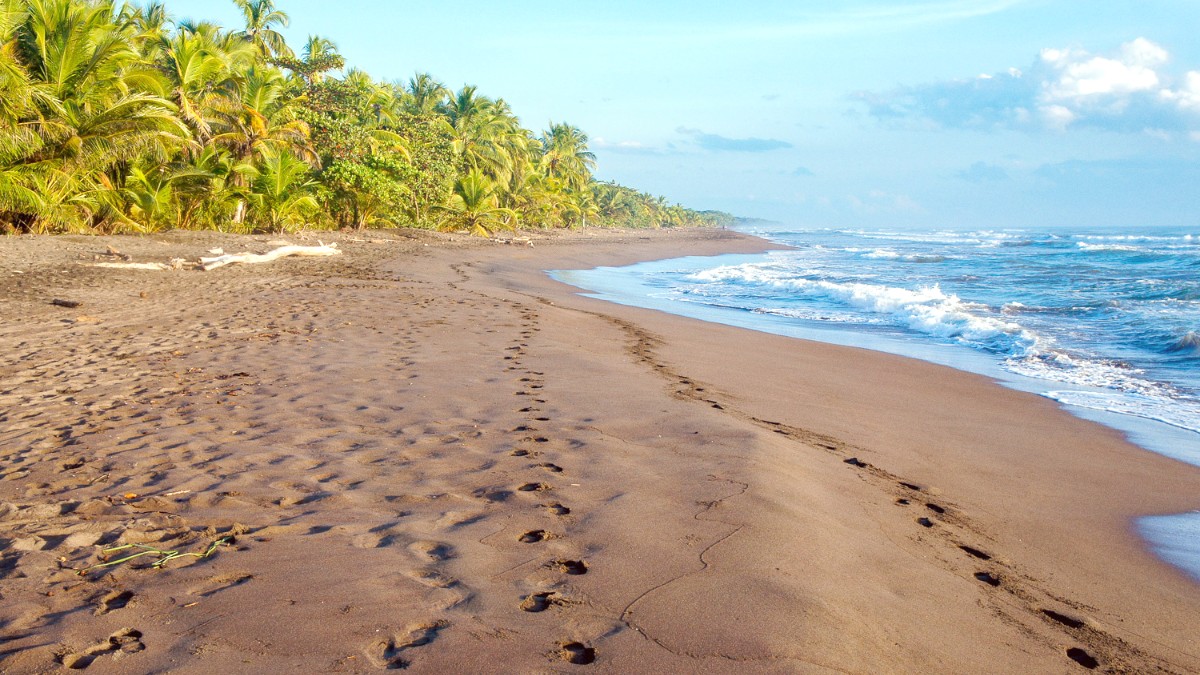
Central Pacific Coast, Costa Rica
General: Lightweight, breathable, moisture-wicking fabrics suit the hot and humid climate. Quick-drying materials aid frequent swimming or rain. Cotton can feel heavy and dry slowly. For the Dry Season (December to April), pack shorts, t-shirts, tank tops, and Swimwear. A light cover-up or thin long-sleeve shirt serves well for slightly cooler evenings or air-conditioned indoor spaces. For the Wet Season (May to November), pack the same clothing types. Add a Lightweight, packable rain jacket or Poncho. Evenings feel slightly cooler after rain, so a light long-sleeve shirt or thin hoodie may prove useful.
Shoes for different terrains.
Light sandals or flip-flops for comfortable strolls on the sand.
Comfortable walking shoes. Jacó's main street is flat and walkable.
Closed-toe shoes with good grip. Protect feet from insects and uneven ground.
Carry your original passport, valid for at least six months beyond your intended stay. If your nationality needs a visa, carry a copy of the visa approval or relevant documentation. Keep digital copies on your phone and in cloud storage. Have both printed and digital copies of your travel insurance policy, including emergency contact numbers and policy details. This information proves helpful in medical emergencies or for trip interruption claims. If you plan to rent a vehicle, an International Driving Permit accompanies your home country's driver's license. While not always strictly enforced for short visits, it can prevent issues. If you have serious medical conditions or allergies, a doctor's note in Spanish for clarity. Keep copies of your flight itineraries, hotel bookings, and tour confirmations. Store digital copies on your phone, in cloud storage, and email them to yourself or a trusted contact. Create a list of family and friends, your embassy or consulate in San José, and local emergency services (911). Keep this list separate from your phone, perhaps in your wallet or a small card. Carry relevant identification if you qualify for potential discounts on attractions or public transport. Check in advance if discounts apply.
Voltage: 120 V. Frequency: 60 Hz. Plug Types: Type A (two flat parallel pins) and Type B (two flat parallel pins and a round grounding pin). These are the same as in the United States and Canada. If traveling from outside North America, a Universal travel adapter that supports Type A/B applies.
Mobile Phone Compatibility: GSM is the predominant mobile technology. Your phone must be unlocked to use a local SIM card. Major Providers: Kolbi (ICE), Claro, and Movistar. Kolbi generally has the widest coverage across Costa Rica. SIM Card Purchase: Purchase SIM cards at Juan Santamarían International Airport (SJO) or at authorized kiosks and supermarkets in Jacó. Registration with your passport is needed. (Airalo for eSIMs)
Google Maps for directions. Waze for real-time traffic.
WhatsApp is widely used. Google Translate for offline Spanish.
Use cloud storage (Google Drive, Dropbox) or an External hard drive for photos and videos.
A destination-specific kit: Band-aids, antiseptic wipes, pain relievers (Ibuprofen/Acetaminophen), antidiarrheal medication (e.g., Imodium), allergy medicine, Hydrocortisone cream for bug bites. Jacó-specific: Anti-itch cream for mosquito bites, rehydration salts to combat dehydration from heat, and blister treatment. A Compact travel first aid kit provides a starting point. Carry all prescription medications in their original labeled containers, with a copy of the prescription or a doctor's note.
Insect Repellent: This is needed. Look for products containing DEET (30-50%) or Picaridin for effective mosquito protection. Sawyer Picaridin Insect Repellent offers a strong option. Sun Protection: Pack High SPF reef-safe sunscreen (SPF 30+), a Wide-brimmed hat, and Sunglasses with UV protection. The sun is intense near the equator. Most common toiletries are available in Jacó supermarkets. However, specific brands or eco-friendly options might be limited. Consider travel-sized biodegradable soap and shampoo, especially for natural areas.
Board rentals and lessons typically cover equipment. If bringing your own board, consider a surfboard travel bag. A surf leash and surf wax are small, useful items.
Lightweight, breathable hiking clothing. Comfortable hiking shoes. Carry a Small daypack for water, snacks, and a Light rain jacket.
Snorkel mask and fins are for rent. Owning your own ensures better fit and hygiene. Binoculars are highly suggested for birdwatching and spotting animals in the jungle, especially in Carara National Park.
For transportation comfort, a Neck pillow, Eye mask, and Earplugs improve long bus rides or noisy accommodation. These small additions make a big difference for rest. For security, small Padlocks for luggage or hostel lockers guard belongings. A Money belt or Hidden travel pouch secures passports and larger sums of cash. An RFID blocking wallet protects credit cards from electronic skimming.
A Reusable water bottle reduces plastic waste and encourages hydration. Many places offer filtered water for refills. A Reusable shopping bag is useful for groceries or souvenirs, minimizing single-use plastic bags. Reusable travel utensils suit street food or picnics, cutting disposable waste.
A quick-drying microfiber beach towel takes up less space.
A book or e-reader for relaxation on the beach.
High-quality reef-safe sunscreens are best brought from home.
Repellents with higher DEET concentrations are harder to find locally.
If you plan multiple water-based activities or travel during the wet season, a reliable Dry bag becomes an indispensable item.
Always roll clothes to maximize space and minimize wrinkles.